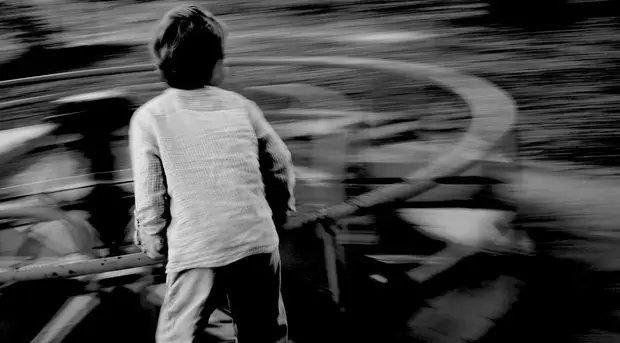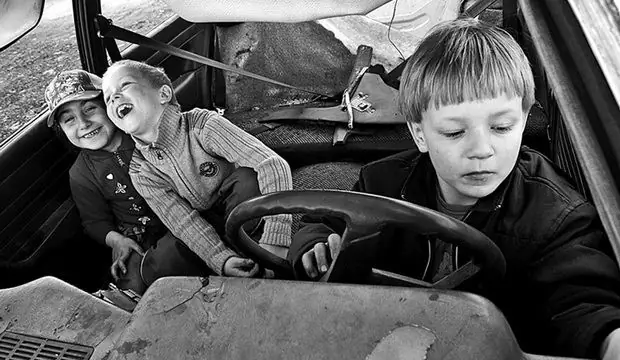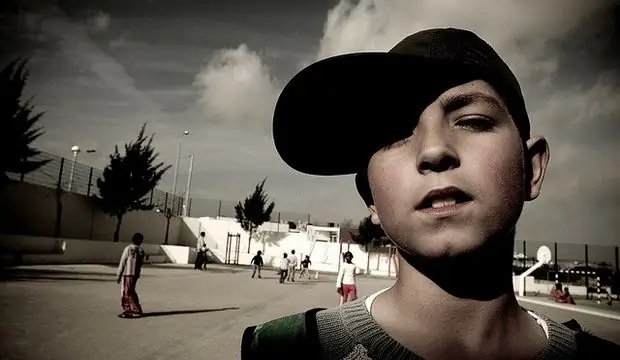- Author Adrian Jeff jeff@psychologosportal.com.
- Public 2023-12-17 05:06.
- Last modified 2025-01-24 14:09.
Hyperactivity in children - how to raise a leader, not a bandit
Increasingly, children seem to us too active, restless, unable to concentrate - not like us. Hyperactivity in children - today this diagnosis is like a stigma attached to children whose activity does not fit into the generally accepted framework …
"Hyperactivity is a set of symptoms associated with excessive motor and mental activity of a child."
Increasingly, children seem to us too active, restless, unable to concentrate - not like us. Hyperactivity in children - today this diagnosis is like a stigma attached to children whose activity does not fit into the generally accepted framework.
Hyperactive children sleep little, often cry, and are mobile and excited during wakefulness. Such children have an increased sensitivity to external stimuli - noise, light, stuffiness, etc.
As they grow up, it becomes obvious that the child is not able to concentrate and do one thing, cannot calmly listen to the fairy tale to the end, constantly jumps up from his seat, does not like to play quiet games.
Such children are characterized by emotional outbursts - they are unbalanced, quick-tempered, show intolerance to their failures. Against this background, there is a violation of relations with other children and adults.
The impulsiveness of hyperactive children leads to the fact that they very often get into trouble and constantly receive comments from adults. Despite the best efforts of parents and educators, it is impossible to cope with such children. They do not recognize any authorities, run away from home, become frequent guests of the police's children's room.
Among these children, the percentage of injuries and infant mortality is very high.
Hyperactivity in children from the point of view of official psychology
Psychologists name a number of signs of a hyperactive child. I will give here the main characteristics on the basis of which this diagnosis is made:
- the child is not able to concentrate even on an interesting activity;
- ignores the appeal of adults;
- often loses things;
- refuses to perform tasks that seem boring to him;
- takes on tasks with enthusiasm, but rarely completes them;
- has difficulties in organizing educational or play activities;
- not able to sit in one place for a long time;
- forgets important information;
- even in infancy he sleeps little;
- does not obey the rules both in school and in games;
- often answers without listening to the question;
- is incessantly in motion;
- interferes in other people's conversations, interrupts the interlocutor.
According to modern psychologists, the presence of a third of the listed signs indicates hyperactivity and the need for behavioral correction. Classes with a psychologist, medications, correction of the daily routine are used …

But the effect of these measures is sometimes almost imperceptible, and in some cases, parents and educators observe a reaction opposite to the expected one. The more pressure is exerted on the child, the more the “negative” aspects of his character are manifested, the more he turns into an uncontrollable child. In addition, the pills kill the brain biochemistry of children, disrupting their healthy development.
At the same time, experts admit that the question of the causes of the development of hyperactivity in children is still open. Someone is looking for the roots of the problem in aggravated heredity, someone is in a hurry to write off everything on the pathology of intrauterine development and birth trauma. Some experts are inclined to believe that hyperactivity in children is provoked by the wrong approach to education.
Why are the measures taken ineffective? Why does a hyperactive child “slide downhill” despite all the educational measures? Why the more adults exert pressure, trying to raise a child to be an exemplary member of society, the stronger the opposition - he is constantly "carried out of the flags"?
The hyperactive child from the point of view of system-vector psychology
The system-vector psychology of Yuri Burlan gives a clear answer to the question of why a very active child sometimes seems to us abnormal, and the educational measures taken are ineffective.
The fact is that the fight is not with the symptoms of the disease, but with the innate properties characteristic of a certain type of people. In the vast majority of cases, the diagnosis of "hyperactivity" is made to children with a urethral vector. Thus, children who have the potential of self-arising leaders, born to lead millions. However, the diagnosis “hyperactive” is also often awarded to children with a skin vector - nimble and restless. But such children, unlike urethral ones, easily perceive discipline and restrictions.
Let's see why the above symptoms seem to us to be symptoms of the disease "hyperactivity".
We perceive the behavior of other people and children in particular through the prism of our own worldview. This applies not only to parents and educators - psychologists also assess their patients subjectively.
Now let's answer the question: "Who are the judges?"
As a tendency, male psychologists are endowed with properties characteristic of the anal and visual vector. In the overwhelming majority of cases, they are calm, even sedate people who can analyze large amounts of information and are prone to perfectionism.
In addition, psychologists have the ability to empathize and empathize - these properties are characteristic of the visual vector. (You can learn more about the properties of these and other vectors by completing the training "System Vector Psychology" by Yuri Burlan.)

From the point of view of a sedate anal-visual psychologist, even a child who is born with the properties of a skin vector is hyperactive. This nimble, long-legged, easy-going baby seems to the anal man too active a child - after all, he evaluates him, taking his own activity as a starting point. As a result, the diagnosis of "hyperactivity" suggests itself.
However, children with a cutaneous vector, due to their innate ability to self-restrict and adapt to the surrounding landscape, relatively rarely receive this diagnosis. And if suddenly a psychologist considers the child to be hyperactive, then the introduction of a strict regime, long walks and sports for hyperactive children will be very useful.
It is quite another matter for children with a urethral vector.
If children with a cutaneous vector are considered hyperactive, then children with a urethral vector, from the point of view of a power psychologist, are hyperactive to the degree of "infinity".
The nature of the urethral child does not initially tolerate the slightest pressure and restrictions. This does not mean that urethral babies are born rebels and hooligans. On the contrary, children with a urethral vector have an innate predisposition to responsibility, they know perfectly well what they want and why.
They don't need laws, because the urethral baby is the law itself, based on justice and mercy.
With the right approach, these children, despite their innate hyperactivity, not only do not cause trouble for either parents or teachers, but also become their active assistants - informal leaders of classes and groups who are responsible for the whole “flock”.
However, when trying to subdue them, "break", make them calmer, urethral boys begin to perceive the world around them as hostile and "declare war on it" with all the uncompromising nature of a born leader.
Urethral boy - features of the upbringing of the future leader
Petya burst out into the courtyard like a small tornado - his shirt is wide open, his hair is tousled, there is a wide grin on his face, and devils in his eyes. He jumped onto the bench, ran along it, jumped down, fell, immediately jumped to his feet, as if thrown by a spring, and rushed on free like the wind.
The guys, bored at the entrance, jumped off and rushed after Petya - a gang of little savages waited for their leader and went “around the world” along the roofs and trees.
And it doesn't matter that the parents will scold for "playing with this bully again": the most obedient "mama's son" cannot resist Petya's charm (read the leader's pheromones).
Petya's mother, looking out the window after her son, only shook her head: what kind of irrepressible child is growing up? You can't keep at home - at least tie it, you don't obey anyone …

Did you recognize your tomboy in this short sketch? All the signs of a hyperactive child are evident - restless, sleeps little, refuses to recognize authorities, constantly gets into trouble and receives comments from adults.
However, from the point of view of system-vector psychology, all this is not a pathology, but properties characteristic of people with an urethral vector - born leaders. If your child fits the description above, then the chances are very high that you are raising a urethral child.
And it only depends on you whether he grows up as the president of a large company or even a country - or the gray hair of your hair will be covered with shame by a criminal authority who has grown up in your family, who does not spare either his or someone else's life.
Raising a hyperactive child with an urethral vector will be easier if you clearly realize that you are raising a person who, sooner or later, will control the destinies of millions. Agree, with such prospects, the standard education schemes are not relevant.
Raising children with an urethral vector has its own characteristics. If you have a child with an urethral vector, you should not become a parent and educator for him, but a “regent under the little king”.
Developing a sense of responsibility in children with urethra
"All hope is only for you!" - this is the best motto under which the education of the urethral boy should take place.
The more developed a sense of responsibility, the more developed the urethral boy, the more likely he will grow up a full-fledged member of society.
Urethral babies grow up very early. If children with other sets of vectors until puberty, and sometimes even longer, are dependent on their parents, then children with urethral vectors very early begin to feel responsibility for their "pack" - their family.
Six-year-old urethral children are already formed personalities, capable of bearing responsibility that is beyond the strength of other children, and sometimes adults.
“Tie your laces faster, son. If we are late for kindergarten, my mother will be fired from her job, we will have no money and the whole family will be hungry. You understand yourself - everything depends only on you! - something like this can provoke a hyperactive child with a urethral vector to perform the actions you need.
The order tone is unacceptable! But invoking responsibility will be very effective.
Urethral boys shouldn't be praised from top to bottom
Leave condescending praise for the children with different vectors. Urethral boy perceives top-down praise as humiliation - such praise infuriates the child.
Imagine that you condescendingly praised your boss - will he be pleased with such praise?

But admiration "from the bottom up" emphasizes the status of such a child and gives him genuine pleasure.
Urethral boys cannot be punished
This is especially true of corporal punishment - it is perceived by the child as a demotion.
The development of such a life scenario is possible in a family where a urethral son is born to a father with an anal vector. Trying to get obedience from his son at any cost, such a father “slaughters” his son. This leads to the fact that the child has a feeling of hostility from the surrounding world.
The reaction to corporal punishment can be the initiation of the erogenous zone: the boy begins to “mark” the corners of his own home with urine, thereby proving his status as a “leader”.
When a child grows up, the reaction to physical punishment is to run away from home - the urethral boy breaks free from the pressure on freedom and begins to fight with the world around him, leading a "flock" - a courtyard mob. This is how the leaders of the most dangerous criminal gangs grow.
Let's sum up
Raising any child is a long and painstaking process. However, the responsibility to the child and to society increases many times over if you have to educate the future leader.
In this case, you cannot rely on innate instincts and "ancestral experience". It is necessary to clearly differentiate the properties inherent in these children by nature, and develop them correctly - only in this case your child will grow up to be a truly happy and full-fledged member of society, ready for great achievements.






